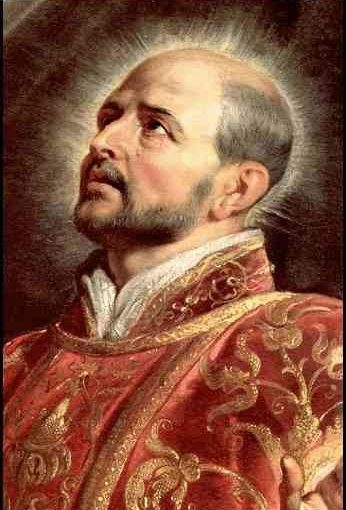“God freely created us so that we might know, love, and serve him in this life and be happy with him forever. God’s purpose in creating us is to draw forth from us a response of love and service here on earth, so that we may attain our goal of everlasting happiness with him in heaven. All the things in this world are gifts of God, created for us, to be the means by which we can come to know him better, love him more surely, and serve him more faithfully.”
—St. Ignatius Loyola
Tag: St Ignatius of Loyola
St Ignatius of Loyola
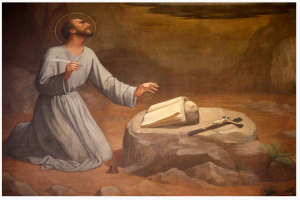 “God freely created us so that we might know, love, and serve him in this life and be happy with him forever. God’s purpose in creating us is to draw forth from us a response of love and service here on earth, so that we may attain our goal of everlasting happiness with him in heaven. All the things in this world are gifts of God, created for us, to be the means by which we can come to know him better, love him more surely, and serve him more faithfully. As a result, we ought to appreciate and use these gifts of God insofar as they help us toward our goal of loving service and union with God. But insofar as any created things hinder our progress toward our goal, we ought to let them go.” ― Ignatius of Loyola
“God freely created us so that we might know, love, and serve him in this life and be happy with him forever. God’s purpose in creating us is to draw forth from us a response of love and service here on earth, so that we may attain our goal of everlasting happiness with him in heaven. All the things in this world are gifts of God, created for us, to be the means by which we can come to know him better, love him more surely, and serve him more faithfully. As a result, we ought to appreciate and use these gifts of God insofar as they help us toward our goal of loving service and union with God. But insofar as any created things hinder our progress toward our goal, we ought to let them go.” ― Ignatius of Loyola
St Ignatius of Loyola
 Today is the liturgical memorial of one of the most influential saints of the 16th century, Saint Ignatius of Loyola. His clarity of thought, his discernment of Spirits and determination to serve the Lord in everything is what set the world on fire with a new charism.
Today is the liturgical memorial of one of the most influential saints of the 16th century, Saint Ignatius of Loyola. His clarity of thought, his discernment of Spirits and determination to serve the Lord in everything is what set the world on fire with a new charism.
Our moment-to-moment task is to keep the Divine Name on our lips “His Name is like fire burning in my heart” (see Jeremiah 20:8), we ought to do everything to serve and love. By no other name are saved but Jesus’.
The Spiritual Exercises are a great gift to the Church; his rules of discernment, contemplation on Divine Love, and thinking with the Church are key to the spiritual life.
In the 16the century Loyola wanted to serve the Lord in model of Saint Dominic and Saint Francis; what ended up happening was a renewal in the manner by which the Church is apostolic — and he (and his spiritual sons had great success until the 1960s. Today, mentioning the word Jesuit is to say “I follow a left-leaning agenda.” One can think of various theologians, philosophers, writers and pastoral ministers who are ordained and professed members of the Society of Jesus. The disasters in ministry, hence, orchestrated by the Jesuits has been scandalous.
We need Loyola and the true beauty of the Society of Jesus; we need real men; we need men who will sacrifice themselves for the greater glory of God; we need Jesuits who will preach the received Gospel and to administer the sacraments according the to mind and heart of the Church. What we don’t need is the faithless Jesuits who do not think with the Church and follow closely what their sainted founder (and the patrimony of saints and blesseds) set out to do for Christ Jesus and His Church.
Saint Ignatius Loyola, pray for us!
St Ignatius of Loyola
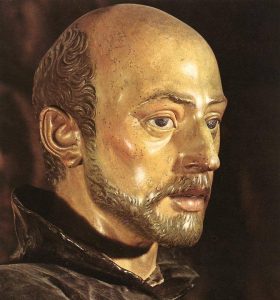 From the life of Saint Ignatius from his own words by Luis Gonzalez
From the life of Saint Ignatius from his own words by Luis Gonzalez
Ignatius was passionately fond of reading worldly books of fiction and tales of knight-errantry. When he felt he was getting better, he asked for some of these books to pass the time. But no book of that sort could be found in the house; instead they gave him a life of Christ and a collection of the lives of saints written in Spanish.
By constantly reading these books he began to be attracted to what he found narrated there. Sometimes in the midst of his reading he would reflect on what he had read. Yet at other times he would dwell on many of the things which he had been accustomed to dwell on previously. But at this point our Lord came to his assistance, insuring that these thoughts were followed by others which arose from his current reading.
While reading the life of Christ our Lord or the lives of the saints, he would reflect and reason with himself: “What if I should do what Saint Francis or Saint Dominic did?” In this way he let his mind dwell on many thoughts; they lasted a while until other things took their place. Then those vain and worldly images would come into his mind and remain a long time. This sequence of thoughts persisted with him for a long time.
But there was a difference. When Ignatius reflected on worldly thoughts, he felt intense pleasure; but when he gave them up out of weariness, he felt dry and depressed. Yet when he thought of living the rigorous sort of life he knew the saints had lived, he not only experienced pleasure when he actually thought about it, but even after he dismissed these thoughts, he still experienced great joy. Yet he did not pay attention to this, nor did he appreciate it until one day, in a moment of insight, he began to marvel at the difference. Then he understood his experience: thoughts of one kind left him sad, the others full of joy. And this was the first time he applied a process of reasoning to his religious experience. Later on, when he began to formulate his spiritual exercises, he used this experience as an illustration to explain the doctrine he taught his disciples on the discernment of spirits.
Saint Ignatius of Loyola
 Blessed Feast of Saint Ignatius of Loyola!
Blessed Feast of Saint Ignatius of Loyola!
“After we experience the great peace of knowing God’s love for us, which quiets our anxieties and insecurities, we find another deep desire stirring within us. We desire greatness because we are made for greatness.”
Here is a primer on the saint.
Saint Joan de Lestonnac
 You know you are in the digital age when you learn about a saint that has an interesting place in people’s lives. This morning I learned of one of today’s liturgical memorials: St. Joan de Lestonnac.
You know you are in the digital age when you learn about a saint that has an interesting place in people’s lives. This morning I learned of one of today’s liturgical memorials: St. Joan de Lestonnac.
According to a biographer, Saint Joan “was born in Bordeaux, France, in 1556. She married at the age of seventeen. The happy marriage produced four children, but her husband died suddenly in 1597. After her children were raised, she entered the Cistercian monastery at Toulouse [at the age of 46]. Joan was forced to leave the Cistercians when she became afflicted with poor health. She returned to Bordeaux with the idea of forming a new congregation, and several young girls joined her as novices. They ministered to victims of a plague that struck Bordeaux, and they were determined to counteract the evils of heresy promulgated by Calvinism. Thus was formed the Order of the Company of Mary our Lady of Bordeaux. In 1608, Joan and her companions received the religious habit from the Archbishop of Bordeaux. Joan was elected superior in 1610, and many miracles occurred at her tomb. She was canonized in 1949 by Pope Pius XII.”
One interesting point for me is that Saint Joan’s concern for souls lost to Calvinism was aided by members of the Society of Jesus. Another biographer writes:
“Two Jesuit priests, Fathers de Bordes and Raymond, whilst they celebrated Mass, received an understanding that they should assist in founding an order to counteract the surrounding heresies and that Joan must be the first superior. The rule and constitutions of the Order were founded on those of St. Ignatius and the first house was opened in the Holy Ghost priory at Bordeaux.”
AND, “Finally, her great love shown by her patient example even whilst she was being emotionally, spiritually, psychologically and physically abused, with her reputation being ruined as a result of lies and hatred, she still remained firm in her Faith and love of God, even converting the person who was so mean and cruel to her. Let us remember the extraordinary example of this beautiful and incredible woman always! St. Joan is a true feminist, true to her Faith, true to her abilities and never afraid to love, even her most vicious enemies! God be praised for this magnificent lady!”
Saint Joan’s body, as a sign of holiness, remains incorrupt.
Saint Ignatius of Loyola
 The Church liturgically recalls for us one of the Master’s of the spiritual life, Saint Ignatius of Loyola. The Pilgrim died in 1556 and was the author of the Spiritual Exercises and founder of the Society of Jesus.
The Church liturgically recalls for us one of the Master’s of the spiritual life, Saint Ignatius of Loyola. The Pilgrim died in 1556 and was the author of the Spiritual Exercises and founder of the Society of Jesus.
It may be a little early to speak of a commemoration for the 500th anniversary of the Spiritual Exercises, but it may be good to keep this anniversary in mind. 2022 is the year when we will study and live the foundational experiences of Ignatius in Manresa. This picture shows Ignatius in awe in meeting the Lord as he writes his religious experience that gave rise to him following his vocation with prayerful intensity. Do we have a similar conviction as Ignatius?
This 2008 animation of an Olive, gives a sense of the life Saint Ignatius of Loyola, written, produced and narrated by Jason Kapell of the Fairfield University Media Center. It is nicely done –remember it is short and sweet with a Spanish Olive narrating.
Making a General Examination of Conscience
From time-to-time I need to be reminded what it means to enter into a holy and general examination of conscience. Over time if I don’t review the method of examination proposed in the Spiritual Exercises of Saint Ignatius of Loyola, I forget. These days I have to admit I am a crusade to make the idea and practice of personal conversion a priority. From what I am sensing in the Church and in secular society we all need a lot less sin in our life, and a lot more happy, healthy and fruitful appreciation of where God’s grace is operative.
Where should you always start, in examining yourself? Loyola makes this proposal:
There are five points in this method
1. The first point is to give thanks to God our Lord for the favors received.
2. The second point is to ask for grace to know my sins and to rid myself of them.
3. The third point is to demand an account of my soul from the time of rising up to the present examination. I should go over one hour after another, one period after another. The thoughts should be examined first, then the words, and finally, the deeds in the same order as was explained under the Particular Examination of Conscience.
4. The fourth point will be to ask pardon of God our Lord for my faults.
5. The fifth point will be to resolve to amend with the grace of God.
Close with an Our Father.
The mystical tradition of the Catholic Church keeps before us the ideal of living in a state of grace because in doing so we walk the path of being in communio (here I will say this means friendship) with God. But other implications of living in a state of grace is that our relationships with others get better, and deeper knowledge of ourselves in action keeps us grounded and less self-righteous.
If you want to know one of the key points of discernment for Pope Francis lived –this is it, an examination of conscience. Plus, the new evangelization that is so much part of our church-existence today revolves around our willingness to examine our mind, heart and actions with a firm desire to amend life. Discernment is key to all things Catholic. An alive, a mature Christian faith is known only to the extent that we give ourselves over to Grace. A certain path to conversion is this method of Loyola.
Francis’ Mass on the feast of St Ignatius 2013, recap
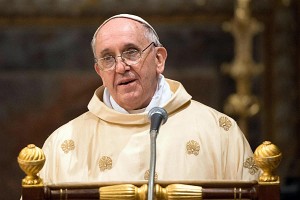 My friend Michael who was present for the papal Mass on the feast of Saint Ignatius on July 31st and posted this recap video. It’s nicely done and it captures a beautiful sensitivity between the the Jesuit bishop of Rome and his brothers who live and work in Rome. A blog post on the papal Mass can be read here.
My friend Michael who was present for the papal Mass on the feast of Saint Ignatius on July 31st and posted this recap video. It’s nicely done and it captures a beautiful sensitivity between the the Jesuit bishop of Rome and his brothers who live and work in Rome. A blog post on the papal Mass can be read here.
I posted His Holiness’ homily here so that you can pray with it.
Saint Ignatius of Loyola pray for the Pope, the Church and all of us.
Francis honors Ignatius, calls us to more faithful life in Christ
The faithfulness to the spiritual patrimony one is raised on is an essential piece of understanding one’s own history and the grace that you’ve been given. That doesn’t mean, in my mind, that you can’t augment the first inspiration with another so you can round-out your life in a new way. Perhaps making the connection between Ignatian spirituality with that of the Benedictine charism. Pope Francis has done that in my mind. He’s faithful to Loyola’s Exercises and yet has an appreciation for many of the Carmelites. Here is the papal homily given earlier in Rome for the liturgical memorial of Saint Ignatius of Loyola, a man who’s path to be a soldier for Christ and His Church was started by a cannonball injury. Later, Ignatius set his eyes on the Lord by doing an extended retreat at the Benedictine Abbey of Montserrat. Recall, it is Ignatius experience with the monks that his conversion takes shape and does the Spiritual Exercises. You would do well to be attentive to the Pope’s quoting of the Spiritual Exercises. AMDG
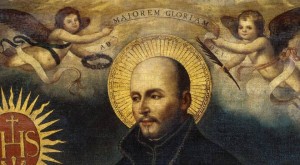 In this Eucharist in which we celebrate our Father Ignatius of Loyola, in light of the Readings we have heard, I would like to propose three simple thoughts guided by three expressions: to put Christ and the Church in the centre; to allow ourselves to be conquered by Him in order to serve; to feel the shame of our limitations and our sins, in order to be humble before Him and before the brothers.
In this Eucharist in which we celebrate our Father Ignatius of Loyola, in light of the Readings we have heard, I would like to propose three simple thoughts guided by three expressions: to put Christ and the Church in the centre; to allow ourselves to be conquered by Him in order to serve; to feel the shame of our limitations and our sins, in order to be humble before Him and before the brothers.
1. The emblem of us Jesuits is a monogram, the acronym of “Jesus, the Saviour of Mankind” (IHS). Every one of you can tell me: we know that very well! But this crest continually reminds us of a reality that we must never forget: the centrality of Christ for each one of us and for the whole Company, the Company that Saint Ignatius wanted to name “of Jesus” to indicate the point of reference. Moreover, even at the beginning of the Spiritual Exercises he places our Lord Jesus Christ, our Creator and Saviour (Spiritual Exercises, 6) in front of us. And this leads all of us Jesuits, and the whole Company, to be “decentred,” to have “Christ more and more” before us, the “Deus semper maior”, the “intimior intimo meo”, that leads us continually outside ourselves, that brings us to a certain kenosis, a “going beyond our own loves, desires, and interests” (Sp. Ex., 189). Isn’t it obvious, the question for us? For all of us? “Is Christ the centre of my life? Do I really put Christ at the centre of my life?” Because there is always the temptation to want to put ourselves in the centre. And when a Jesuit puts himself and not Christ in the centre, he goes astray. In the first Reading, Moses forcefully calls upon the people to love the Lord, to walk in His ways, “because He is your life” (cf. Deut. 30, 16-20). Christ is our life! The centrality of Christ corresponds also to the centrality of the Church: they are two flames that cannot be separated: I cannot follow Christ except in and with the Church. And even in this case we Jesuits and the whole Company, are not at the centre, we are, so to speak, “displaced”, we are at the service of Christ and of the Church, the Bride of Christ our Lord, who is our Holy Mother Hierarchical Church (cf. Sp. Ex. 353). To be men routed and grounded in the Church: that is what Jesus desires of us. There cannot be parallel or isolated paths for us. Yes, paths of searching, creative paths, yes, this is important: to go to the peripheries, so many peripheries. This takes creativity, but always in community, in the Church, with this membership that give us the courage to go forward. To serve Christ is to love this concrete Church, and to serve her with generosity and with the spirit of obedience.
2. What is the way to live this double centrality? Let us look at the experience of Saint Paul, which was also the experience of Saint Ignatius. The Apostle, in the Second Reading that we heard, writes: I press on towards the perfection of Christ, “because I have indeed been conquered by Jesus Christ” (Phil. 3:12). For Paul it came along the road to Damascus, for Ignatius in his house at Loyola, but the fundamental point is the same: to allow oneself to be conquered by Christ. I seek Jesus, I serve Jesus, because He sought me first, because I was conquered by Him: and this is the heart of our experience. But He is first, always. In Spanish there is a word that is very graphic, that explains this well: He “primerea” first ahead of us, “El nos primerea”. He is always first. When we arrive, He has already arrived and is expecting us. And here I want to recall the meditation on the Kingdom in the Second Week. Christ our Lord, the eternal King, calls each one of us, saying to us: “He who wants to come with Me must work with Me, because following Me in suffering, he will follow after Me likewise in glory” (Sp. Ex. 95): Being conquered by Christ in order to offer to this King our whole person and all our hard work (cf. Sp. Ex. 96); to say to the Lord that he would do anything for His greater service and praise, to imitate Him in bearing even injury, contempt, poverty (Sp. Ex. 98). But I think of our brother in Syria in this moment. To allow ourselves to be conquered by Christ means to be always directed towards what is in front of me, toward the goal of Christ (cf. Phil. 3:14), and to ask oneself with truth and sincerity: “What have I done for Christ? What am doing for Christ? What must I do for Christ?” (cf. Sp. Ex. 53).
3. And I come to the final point. In the Gospel, Jesus says to us: “Whoever would save his life will lose it, but whoever loses his life for my sake will save it . . . If anyone is ashamed of me . . .” (Lk 9:23). And so on. The shame of the Jesuit. The invitation that Jesus makes is for us to never be ashamed of Him, but to always follow Him with total dedication, trusting Him and entrusting ourselves to Him. But looking at Jesus, as Saint Ignatius teaches us in the First Week, above all looking at Christ crucified, we have that very human and noble feeling that is the shame of not reaching the highest point; we look at the wisdom of Christ and at our ignorance; at His omnipotence and our weakness; at His justice and our iniquity; at His goodness and our wickedness (cf. Sp. Ex. 59). Ask for the grace of shame; the shame that comes from the constant dialogue of mercy with Him; the shame that makes us blush before Jesus Christ; the shame that puts us in tune with the heart of Christ who is made sin for me; the shame that harmonises our heart in tears and accompanies us in the daily following of “my Lord”. And this always brings us, as individuals and as a Company, to humility, to living this great virtue. Humility that makes us understand, each day, that it is not for us to build the Kingdom of God, but it is always the grace of God working within us; humility that pushes us to put our whole being not at the service of ourselves and our own ideas, but at the service of Christ and of the Church, like clay pots, fragile, inadequate, insufficient, but having within them an immense treasure that we carry and that we communicate (2 Cor. 4:7). It is always pleasant for me to think of the sunset of the Jesuit, when a Jesuit finishes his life, when the sun goes down. And two icons of the sunset of the Jesuit always come to me: one classical, that of Saint Francis Xavier, looking at China. Art has painted this sunset so many times, this ‘end’ of Xavier. Even in literature, in that beautiful peace by Pemàn. At the end, having nothing, but in the sight of the Lord; it does me good to thing about this. The other sunset, the other icon that comes to me as an example, is that of Padre Arrupe in the last interview in the refugee camp, when he told us – something he himself said – “I say this as if it were my swan song: pray.” Prayer, the union with Jesus. And, after having said this, he caught the plane, and arrived at Rome with the stroke that was the beginning of so long and so exemplary a sunset. Two sunsets, two icons that all of us would do well to look at, and to go back to these two. And to ask for the grace that our sunset will be like theirs.
Dear brothers, let us turn again to Our Lady, to her who bore Christ in her womb and accompanied the first steps of the Church. May she help us to always put Christ and His Church at the centre of our lives and of our ministry. May she, who was the first and most perfect disciple of her Son help us to allow ourselves to be conquered by Christ in order to follow Him and to serve Him in every situation. May she that answered the announcement of the Angel with the most profound humility: “Behold the handmaid of the Lord, be it done unto me according to thy word” (Lk 1:38), make us feel the shame for our inadequacy before the treasure that has been entrusted to us, in order to live the virtue of humility before God. May our journey be accompanied by the paternal intercession of Saint Ignatius and of all the Jesuit saints, who continue to teach us to do all things “ad majorem Dei gloriam.”
